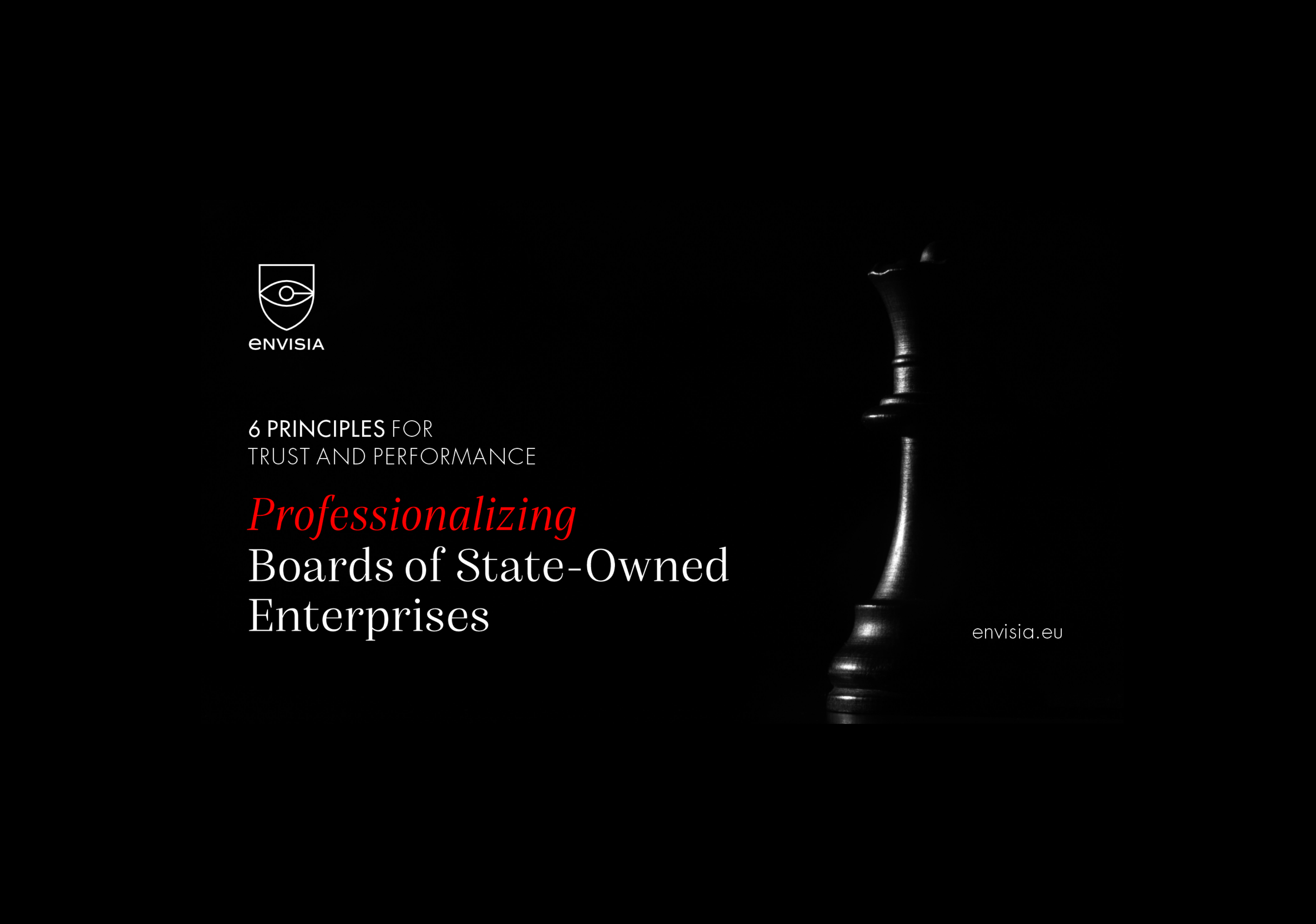Envisia recommends measures for professionalising the boards of directors of state‑owned enterprises, actively supporting the Bolojan government’s reforms

Recommendations submitted to the Prime Minister’s Chancellery
Romania needs professional boards of directors to deliver public value, attract financing and regain investor confidence. Over the last three months, Envisia has successively submitted to the Prime Minister’s Chancellery a set of pragmatic recommendations that can be implemented gradually, with a direct impact on the quality of selection and performance of boards in state‑owned enterprises. The aim is to professionalise the role of the board member by establishing unitary standards for selection, education and evaluation, overseen independently.
Why now
- OECD milestones and PNRR requirements call for clear, verifiable standards for the governance of state‑owned companies. Extended interim appointments and uneven procedures affect stability and performance. The recommendations address these vulnerabilities without reinventing the legislative framework.
- Boards of directors have a strategic role in the economy and must balance financial performance with public interest and sustainability. Professionalisation shifts the focus from ‘ticking compliance boxes’ to strategic governance oriented towards public outcomes.
What we propose (in brief)
- Long‑term vision oriented towards the public interest. Boards of state‑owned enterprises are not just administrators of the present but architects of the future: they must anticipate economic, social and technological transformations and balance performance objectives with their mandate of public interest and sustainability. Reforming the appointment and operating framework of boards is key to moving from compliance to strategic governance.
- Standardised education for board members (initial + continuous). Compulsory initial training at the start of the mandate and continuous annual training aligned with regulations (including those related to digital and cyber aspects as well as sustainability), risks and current trends.
- Mandatory competence matrix for board members, published annually. Boards transparently declare their key competences (strategy, finance & audit, risk, sustainability, legal & integrity, procurement, stakeholder engagement, digital & cyber, human capital & succession), identify any competences not covered by the existing board structure and show how they address these through selection and education.
- Meritocratic selection and operation based on firm principles of good governance. Real independence (at least one third independent non‑executive members), an independent expert, annual evaluation and self‑evaluation with professional external support, transparency and accountability through annual reporting, diversity, term limits (maximum eight years), ethics and declarations of interests; elimination of provisional mandates.
- Independent oversight of the nomination process. Operationalisation of the authorities responsible for nomination and monitoring and the establishment of an Independent Expert Consortium (7–9 members) with supervisory powers, including compliance verification, the possibility to invalidate non‑compliant appointments and the requirement for an annual external audit.
- KPIs and public reporting at both board and member levels. Performance indicators and annual reporting; for listed companies, the additional application of the Bucharest Stock Exchange Corporate Governance Code.
Important
These recommendations strictly target the professionalisation of boards of directors (selection, education, evaluation, transparency, independent oversight). They do not claim to reform public governance in Romania as a whole.
Expected public benefit
- Reduced political interference in board appointments and increased public and investor confidence.
- Alignment with OECD/EU best practices and better access to external funding.
- Improved strategic decision‑making at board level and sustainable performance of state‑owned companies.
CEO statement
“The recommendations we have officially submitted to the Prime Minister’s Chancellery centre on professionalising the role of board member and transforming this role into an active one that creates concrete value. We proposed clear and verifiable measures related to the selection process: meritocracy, real independence of the boards (including annual evaluation with professional external support), a transparent competence matrix for board members, clear requirements related to education, accountability and public reporting of performance. We also propose streamlining the authorities responsible for nomination and monitoring, the establishment of an independent consortium with a supervisory role and an annual external audit — as international best practices require. The stake is not bureaucratic; it is about public value and investor confidence,” declared Carmen Micu, CEO of Envisia.
About Envisia
Envisia is the first institution in Romania dedicated to the professionalisation of board members and the promotion of good corporate governance practices. It offers advanced education programmes and a community of leaders oriented towards impact. The exclusive Envisia board community numbers over 180 professional non‑executive directors who have completed the postgraduate programme with triple global accreditation run by Henley Business School and Envisia, and more than 130 members certified in Romania — alumni of the Governance that Creates Value programme — including chairs of boards, non-executive members, executives and representatives of various public and private organisations. In addition, over 500 leaders have participated in various courses and programmes offered by Envisia during its more than five years of activity.
Recommended articles
Leadership, Boardroom Dynamics & Crisis Response
Leadership, Boardroom Dynamics & Crisis Response
Governance & Board Effectiveness
Future of Boards & NED Careers
Future of Boards & NED Careers
ESG & Risk Oversight
Leadership, Boardroom Dynamics & Crisis Response
Governance & Board Effectiveness
Governance & Board Effectiveness
Leadership, Boardroom Dynamics & Crisis Response
Future of Boards & NED Careers
Governance & Board Effectiveness
Governance & Board Effectiveness
Governance & Board Effectiveness
Governance & Board Effectiveness
Future of Boards & NED Careers
Leadership, Boardroom Dynamics & Crisis Response
Future of Boards & NED Careers
 BACK TO ARTICLES
BACK TO ARTICLES
 Facebook
Facebook Linkedin
Linkedin
